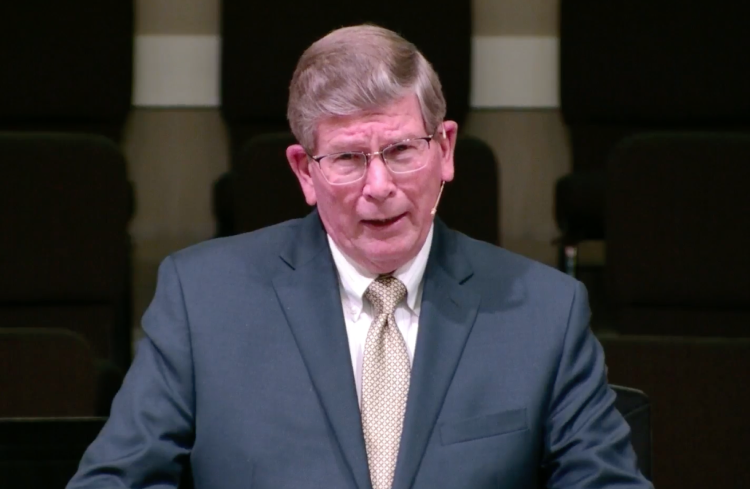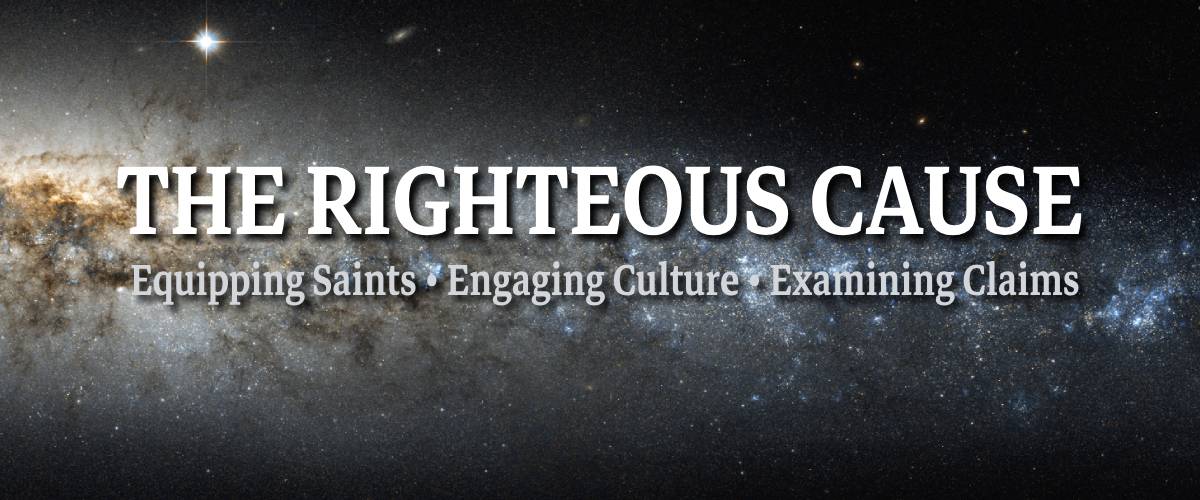
Meet Mark Minnick — Senior Pastor,
Mount Calvary Baptist Church, Greenville, SC

Mark Minnick earned his M.A. in Bible from Bob Jones University in 1977 and completed his Ph.D. in New Testament Interpretation in 1983. He served as associate pastor under Jesse Boyd at Mount Calvary Baptist Church (Greenville, SC) while teaching full-time at BJU in Bible and Homiletics. In May 1989, he became the church’s first full-time senior pastor.
Mark and his wife Linda have three married daughters: Abigail (married to Dr. Nathan Crockett), Esther (married to Sam Arnold), and Lydia (married to Ethan Hamilton).
His ministry extends internationally through mission field visits and board service with Gospel Fellowship Association Missions and Foundations Baptist Fellowship International. He contributes to FrontLine Magazine with his “First Partakers” column and serves on the Committee on the Bible’s Text and Translation.
Mark’s ministry philosophy emphasizes systematic biblical exposition and community evangelism, seeking to display God’s glory revealed in Jesus Christ.
This sermon was delivered during the Tri-City Baptist Church Missions Conference, September 2025. The video of Pastor Minnick’s sermon is here.
The following is the audio file.
Complete Sermon Summary and Biblical Assessment
Executive Summary
This complete sermon from Tri-City Baptist Church presents a comprehensive theological framework for understanding Christian mission through what the preacher calls “the divine viewpoint.” The message systematically develops the theme of God’s predetermined plan for universal submission to Christ, tracing this concept through Psalm 2, Isaiah 45:21-25, Romans 10 and 14, and Philippians 2. The preacher argues that Christian missions operate within the certainty of God’s ultimate victory, where every knee will bow to Christ either voluntarily through conversion or compulsorily at the final judgment.
Structural Overview
The sermon follows a carefully constructed theological progression:
- Foundation: Psalm 2’s pattern of rebellion and divine response
- Prophetic Declaration: Isaiah 45’s divine determination of universal submission
- Present Application: Romans 10’s description of individual conversion
- Accountability Reality: Romans 14’s warning for believers
- Ultimate Fulfillment: Philippians 2’s eschatological consummation
Main Theological Themes
1. The Topographical Hermeneutic
The preacher employs a “topographical map” approach to Scripture, identifying certain passages as “peaks” or “Himalaya Heights” that represent climactic moments of divine revelation. This methodology:
- Treats some biblical texts as more foundational than others
- Emphasizes the cumulative nature of biblical revelation
- Identifies key passages that illuminate God’s ultimate purposes
- Connects Old Testament prophecy with New Testament fulfillment
2. The Perpetual Pattern of International Insurrection (Psalm 2)
Historical Context
The sermon identifies four stanzas in Psalm 2:
- Verses 1-3: Nations in perpetual rebellion against God’s government
- Verses 4-6: God’s response from heaven, enthroning His Son
- Verses 7-9: The Son’s decree of universal dominion
- Verses 10-12: Call for submission and warning of judgment
Christological Application
The preacher connects this psalm to:
- Christ’s Post-Resurrection Authority (Matthew 28:18-20)
- Peter’s Pentecost Sermon (Acts 2:22-36)
- The Great Commission as fulfillment of the divine decree
Theological Strength: The sermon correctly identifies Psalm 2 as messianic and properly connects it to New Testament Christology. The emphasis on Christ’s authority as the foundation for missions is biblically sound.
3. The Divine Determination of Universal Individual Submission (Isaiah 45:21-25)
The Central Thesis
The preacher’s main argument centers on Isaiah 45:23: “I have sworn by myself, the word has gone out of my mouth in righteousness and shall not return: ‘To me every knee will bow, every tongue will take an oath.'”
Four Components of Divine Determination
Component 1 (v. 23): Universal submission to God’s authority
- Every knee will bow
- Every tongue will confess
- Divine oath guarantees fulfillment
Component 2 (v. 24a): Individual acknowledgment of God’s righteousness
- Personal confession: “In the Lord I have righteousness and strength”
- Voluntary recognition of divine authority
- Individual conversion experience
Component 3 (v. 24b): Judgment on the rebellious
- Those “incensed against him” will be ashamed
- Universal human rebellion exposed
- Divine vindication of righteousness
Component 4 (v. 25): National restoration of Israel
- “All descendants of Israel shall be justified”
- Eschatological conversion of the Jewish nation
- Reference to Zechariah’s prophecy of national mourning
Theological Anthropology
Drawing from Romans 8:7-8, the preacher explains that “the mind of the flesh is enmity against God” and “cannot be subject to the law of God.” This leads to the conclusion that universal human rebellion characterizes all humanity, not merely obvious opponents of Christianity.
4. Present Fulfillment in Individual Conversion (Romans 10)
The Conversion Process
The sermon presents conversion as fulfillment of Isaiah 45:23 through:
- Confession with the mouth: “Jesus is Lord”
- Belief in the heart: God raised Jesus from the dead
- Universal accessibility: Same for Jew and Gentile
- Simple calling: “Whoever calls on the name of the Lord shall be saved”
Historical Illustrations
The preacher provides compelling historical examples:
John Wesley (1703-1791):
- Converted in 1738 on Aldersgate Street, London
- Declared “the world is my parish”
- Traveled 250,000 miles and preached 40,000 sermons
- Challenged parish system restrictions
William Carey (1761-1834):
- “Father of Modern Missions”
- Created a leather globe marking spiritual conditions
- Overcame Hyper-Calvinist opposition (“sit down, young man”)
- Translated Scripture into multiple Indian languages
- Modest conversion results despite decades of labor
Robert and Mary Moffat:
- South African missionaries
- Ten years before the first communion service
- Mary’s faith: “There will be a harvest”
- Connected to David Livingstone’s calling
These illustrations demonstrate the tension between divine sovereignty in missions and apparent human failure, supporting the sermon’s thesis about God’s ultimate determination.
5. Believer Accountability (Romans 14)
Present Application for Christians
The preacher applies Isaiah 45:23 to believers through Romans 14:10-12:
- All believers will stand before Christ’s judgment seat
- An account must be given for Christian living
- Warning against living “unto ourselves”
- Assurance for those walking faithfully
Pastoral Balance
The sermon maintains a balance between:
- Assurance: God’s grace covers confessed sin
- Accountability: Believers must answer for their stewardship
- Motivation: Serving Christ rather than self
- Joy: Living “happily and joyfully unto Him”
6. Ultimate Eschatological Fulfillment (Philippians 2:5-11)
The Exaltation of Christ
The sermon’s climax focuses on Philippians 2:9-11:
- Christ’s exaltation follows His humiliation
- “The name above every name” = “Lord Jesus”
- Universal submission includes heavenly, earthly, and demonic beings
- Even Satan will bow and confess Christ’s lordship
Theological Implications
- Compulsory Confession: Even demons are constrained to acknowledge Christ
- Universal Scope: Every intelligent being will submit
- Divine Glory: All confession serves “the glory of God the Father”
Missiological Framework
Mission Theology
Sovereignty and Human Agency
The sermon addresses the classic tension between divine sovereignty and human responsibility in missions:
Divine Sovereignty:
- God has predetermined the ultimate outcome
- Prophetic certainty guarantees success
- Individual conversions fulfill divine decree
- Historical opposition cannot thwart God’s plan
Human Responsibility:
- Missionaries must proclaim the gospel faithfully
- Individual response required for conversion
- Accountability for stewardship of the message
- Urgency in evangelistic proclamation
Historical Perspective
The preacher places contemporary missions within redemptive history:
- Pattern established in Psalm 2’s cosmic conflict
- Prophetic foundation in Isaiah’s declarations
- Apostolic model in early church preaching
- Historical fulfillment through missionary endeavors
Evangelistic Message Content
Based on the sermon’s analysis, the gospel message should include:
- Recognition of Rebellion: Universal human opposition to God
- Christ’s Authority: Jesus as exalted Lord and Savior
- Call to Submission: “Kiss the Son” – personal allegiance to Christ
- Promise of Blessing: “Blessed are all who put their trust in Him”
- Urgency Warning: Judgment for continued rebellion
Biblical and Theological Assessment
Exegetical Strengths
- Contextual Interpretation: Strong understanding of messianic psalms and their New Testament fulfillment
- Canonical Theology: Effective integration of Old and New Testament passages
- Christological Focus: Proper emphasis on Christ’s person and work
- Historical Awareness: Good grasp of redemptive-historical development
- Pastoral Application: Practical connection to Christian living and missions
Theological Evaluation
Doctrinal Orthodoxy
The sermon maintains strong evangelical theological commitments:
Biblical Authority: Scripture treated as divine revelation
Christological Centrality: Jesus Christ as Lord and Savior
Soteriological Clarity: Salvation by faith through grace
Eschatological Hope: Confidence in God’s ultimate victory
Anthropological Realism: Biblical view of human sinfulness
Systematic Coherence
The theological framework demonstrates internal consistency in connecting:
- Divine sovereignty with evangelistic urgency
- Prophetic certainty with missionary responsibility
- Individual conversion with cosmic redemption
- Present accountability with future hope
Contemporary Relevance
Missional Theology Contributions
Strengths:
- Confidence Building: Provides a theological foundation for perseverance
- Cosmic Perspective: Places local efforts within the universal plan
- Historical Consciousness: Connects with centuries of faithful witness
- Balanced Motivation: Combines divine sovereignty with human responsibility
Pastoral and Practical Implications
For Missionaries
- Theological Foundation: Robust biblical basis for cross-cultural ministry
- Perseverance Motivation: Confidence despite apparent failures
- Message Clarity: Clear content for evangelistic proclamation
- Historical Perspective: Encouragement from past faithful witnesses
For Local Churches
- Missions Vision: Cosmic scope of God’s redemptive plan
- Prayer Focus: Intercession grounded in divine sovereignty
- Financial Support: Investment in God’s predetermined success
- Member Mobilization: Every believer is accountable for stewardship
For Individual Christians
- Personal Discipleship: Recognition of Christ’s lordship
- Evangelistic Urgency: Understanding of prophetic fulfillment
- Spiritual Accountability: Awareness of future judgment
- Joyful Service: Confidence in God’s ultimate victory
Critical Assessment and Recommendations
Theological Strengths to Maintain
- Biblical Foundation: Continue emphasis on scriptural authority
- Christological Focus: Maintain centrality of Christ’s lordship
- Sovereignty-Responsibility Balance: Preserve tension between divine decree and human agency
- Historical Consciousness: Keep a connection with the missionary heritage
Methodological Suggestions
- Exegetical Precision: Ground interpretive claims in historical-grammatical analysis
- Systematic Integration: Connect more fully with broader theological disciplines
- Pastoral Sensitivity: Address practical questions about apparent mission failures
- Contemporary Application: Engage current missiological discussions
Conclusion
This sermon presents a theologically sophisticated framework for understanding Christian missions within the context of God’s sovereign plan for universal submission to Christ. The preacher demonstrates strong biblical knowledge, pastoral sensitivity, and missional vision. The emphasis on divine sovereignty provides both confidence and motivation for evangelistic engagement.
The theological foundation is generally sound, with proper attention to Christ’s authority, human responsibility, and eschatological hope. The historical illustrations effectively demonstrate the tension between apparent failure and ultimate divine success in missionary endeavors.
The sermon provides a valuable contribution to evangelical missions theology. The framework successfully integrates systematic theology with practical ministry concerns, offering both motivation and guidance for faithful gospel proclamation.
Overall Assessment: Theologically robust with a strong biblical foundation and practical relevance, though requiring refinement in hermeneutical method and broader engagement with cultural and social dimensions of Christian mission.
The sermon’s central thesis—that Christian missions operate within God’s predetermined plan for universal submission to Christ—provides both theological grounding and practical motivation for continued faithful witness in the face of apparent opposition and limited immediate results.
